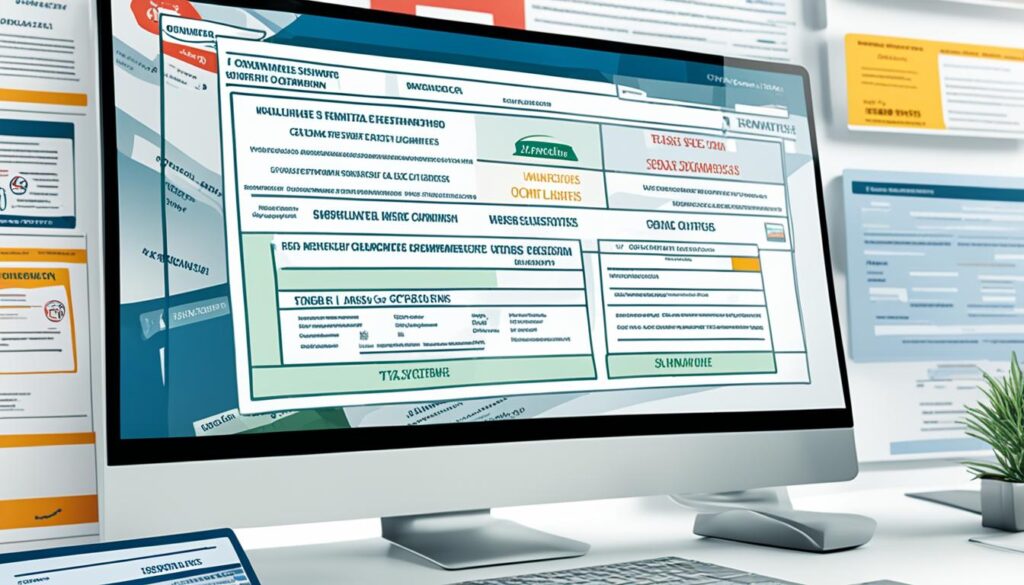Physical Address
304 North Cardinal St.
Dorchester Center, MA 02124
Physical Address
304 North Cardinal St.
Dorchester Center, MA 02124

Understand the legal requirements for launching an online store to safeguard your business, protect intellectual property, and comply with consumer laws.
Surprisingly, 45 states and Washington D.C. have a state-wide sales tax. Locations like cities, counties, and special districts can add more. This makes the sales tax system complicated for those starting an online business.
When you start selling goods online, you have many legal things to think about. These include registering your business and protecting your brand. You also need to get the right licenses and permits, make sure you pay your taxes, and handle how you process payments. It can feel like a lot, but doing things right from the start can save you from big problems later.
Starting your online store right means making sure your business and trademarks are legally sound. First, check if the name you picked is truly yours to use. Look for other businesses using the same name. Not doing this check could lead to big legal problems.
To know if you can own the name or logo you picked, research at state and federal levels. This step helps you avoid having to change your branding later if someone else already owns it. Many online resources can help with this search, making it simple and cost-effective.
If your chosen trademark is clear, register it with the proper authorities. This step is vital if you plan to sell your goods worldwide. It legally protects your brand from others using similar names or logos. With this protection, you have the right to stop others from causing confusion with your mark.
Besides your trademark, picking the right business structure is key. You can choose from several, such as LLC, corporation, or partnership. Talk to a tax expert to decide what’s best for your business. The right choice will protect you, affect your taxes, and set you up for growth. Ensure you properly register your chosen business type to solidify your store’s legal base.
Starting your online store means making sure you have the right local business licenses and permits. Your location and the kind of business will determine what you need. Even online stores must follow the rules.
First, look into your city, county, and state laws to find out what’s needed. You might require business licenses, seller’s permits, and more. Not getting these can lead to fines or your store closing, so it’s key to meet all rules.
| License or Permit | Purpose | Typical Requirements |
|---|---|---|
| Business Operation License | Authorizes the operation of a business in a specific location | Varies by jurisdiction, may include fees, zoning approval, and other criteria |
| Seller’s Permit | Allows the collection and remittance of sales tax on retail transactions | Obtained from the state, with requirements that differ across states |
| Home Occupation Permit | Ensures a home-based business complies with local zoning regulations | Typically issued by city or county, with restrictions on space usage, visitors, and more |
| Occupational License | Required for specific industries or professional services | Depends on the nature of the business and may involve exams, fees, and ongoing education |
By knowing and getting all required business licenses and permits, you can ensure your online store thrives. This avoids headaches and problems later on.

Online businesses need to be proactive about protecting themselves. The Digital Millennium Copyright Act (DMCA) offers a big help. It gives a “safe harbor” to ecommerce sites. It protects them from being held responsible for copyright issues in content by third parties.
The DMCA started in 1998 to guide online service providers (OSPs) on avoiding copyright problems. It has safe harbor rules (17 U.S.C § 512) that include four main points: storing, transmitting, caching, and finding information. So, if you quickly remove copyright-infringing content when you get a proper complaint, you’re protected by the DMCA.
To get the protection of the DMCA safe harbor, your online store needs to sign up with the U.S. Copyright Office. You must also pick someone to receive complaints about copyright violations. This step is vital for keeping your business safe from expensive legal actions. It allows you to show your focus on good customer service, not just legal issues.
For an online store to thrive, it needs clear rules and a solid privacy policy. These guide customers on using the website and protect their data.
Copying from others is not wise for your terms of use. It’s better to make rules that fit your business and follow the law. Include things like how to pay, deal with mistakes, and solve problems.
It’s good to show your terms clearly, whether by click or browse. Clicking to agree means more in court.
Your privacy policy must be very clear about how you use customer data. If you sell in the US, remember the California Online Privacy Protection Act of 2003. It asks you to show it in a way everyone can see.
This policy needs to say what data you collect, how you use it, and who sees it. Let people know their rights about their data.

Getting a lawyer to make these documents for you is smart. They’ll make sure everything’s right and cuts down on risks. Having these rules shows you care about your customers and helps them trust you.
Running an online shop means you must keep up with sales tax rules. Tax rates differ widely among states, cities, and even some special districts. Knowing your tax obligations is key. If you fail to charge the right sales tax, you could face big fines.
Ecommerce businesses also need to think about import duties and export taxes for international deals. It’s smart to look into what import/export taxes might apply to you. This can prevent surprise costs and shipment delays.
Some places have started adding ecotaxes on harmful products or packing. Keeping up with these ecotax rules is crucial for your online shop’s compliance.
Working with a tax expert can make dealing with sales tax, import/export duties, and ecotaxes much easier. They can help you collect the correct tax amounts. This advice can prevent fines and keep your shop legal.
Keeping customer payment info safe is key for online businesses. It’s crucial to choose a PCI-DSS compliant payment gateway. This means it follows the Payment Card Industry Data Security Standard to protect financial data. For businesses with EU customers, following GDPR compliance in handling personal info is a must.
The PCI set rules for handling payments safely worldwide. It stresses the importance of data security and fraud protection. Following these can prevent data leaks and big fines.
In California, the California Consumer Privacy Act (CCPA) asks online stores to track user data carefully. The General Data Protection Regulation (GDPR) in the EU requires businesses to protect personal info of EU residents. They must use strict data privacy and security measures.
Adding SSL (Secure Sockets Layer) certification to your site boosts security and customer trust. This SSL certification encrypts data between customers and your site. It keeps payment information and other details safe.

It’s vital to register your own trademarks, patents, and copyrights. Also, respect others’ intellectual property rights when you start your online store. Make sure you have the right to use any third-party content, like pictures, text, or videos, on your site. Not doing this might lead to copyright claims. Protecting your own intellectual property and respecting others’ will keep you out of legal trouble.
Protecting your brand’s trademark, any patents you have, and your website’s content copyrights is important. At the same time, avoid using others’ intellectual property without permission. Be sure to research and get the needed licenses for any third-party materials. Doing this can stop lawsuits and keep your online store’s reputation strong.

| Intellectual Property Type | Description | Key Considerations |
|---|---|---|
| Trademark | A trademark is a word, phrase, symbol, or design that identifies and distinguishes the source of one party’s goods or services from those of others. | Conduct a thorough trademark search to ensure the name and branding you choose for your online store is available and does not infringe on existing trademarks. |
| Patent | A patent is a form of intellectual property that gives the inventor the right to exclude others from making, using, selling, or importing the patented invention for a limited period of time. | If your online store offers any innovative products or processes, consider applying for patent protection to safeguard your competitive advantage. |
| Copyright | Copyright is a form of intellectual property protection that grants the creator of an original work exclusive rights to the work, usually for a limited time. | Ensure you have the necessary permissions and licenses to use any copyrighted content, such as images, text, or multimedia, on your ecommerce website. |
As an ecommerce business, dealing with shipping rules and restrictions can be tough. Each carrier has specific rules on what can be shipped. This makes it hard to know what products may face hurdles.
Products like hazmat, flammable items, and some perishables are commonly restricted. Navigating these shipping restrictions is essential for smooth operations.
It’s vital to know the shipping limits for what you sell. Different carriers have various rules. For example, items such as aerosols, animals, explosives, and nail polish could face restrictions.
This means they might need special care or might not be able to ship at all. Knowing these rules can help avoid future problems.
Expanding into international shipping brings new challenges. Each country has its own customs regulations and tax rules. Not following these can cause serious issues.
To ensure smooth delivery, research the import and export rules of your target countries. This step is critical for providing top-notch service to your global clients.
Managing inventory and choosing how to fulfill orders can carry legal weight for your online business. Planning to stock a lot of items at home requires checking if it’s allowed by zoning laws and your homeowners association. Having a good inventory management system that meets these rules will prevent problems.
Having a home-based business is often cheaper and appealing for many online sellers. But, you must look into the rules for home-based businesses in your place. This might mean getting a special permit, following size limits, and making sure your business respects local zoning laws.
Instead of keeping stock at home, you can work with a third-party logistics company or rent a warehousing space for shipping orders. This choice helps follow rules better and makes your business more scalable and efficient. Understanding the laws about managing stock and shipping is key. It keeps your online shop legal and sustainable.
Your online store could face age restrictions or extra product compliance rules, depending on what you sell. For instance, selling alcohol, tobacco, or guns might only be allowed for adult customers. Likewise, areas like supplements or medical devices could have their own set of rules.
It’s vital to deeply look into what laws apply to your goods to prevent fines. This will also help make sure your customers can safely buy from you. Knowing and following these age restrictions and product compliance rules is key to your online store’s success over time.
Starting an online store means paying close attention to many legal aspects. You have to protect your business, respect others’ rights, and follow laws that help consumers. This includes things like registering your business, protecting your brand with trademarks, and drafting important documents such as terms of use and privacy policies. It’s critical to know and handle these legal considerations early on. This can help your online store grow steadily and prevent big problems in the future.
Dealing with the many ecommerce compliance and online business regulations might feel overwhelming. But, it’s key for a successful and legal e-commerce business. Being proactive on these fronts can safeguard your business, earn your customers’ trust, and keep you from common mistakes. Your online store can avoid dangers if you prepare carefully.
In the end, making legal considerations, ecommerce compliance, and online business regulations a priority lays the groundwork for strong growth. Understanding and meeting these legal needs early lets you concentrate on business growth. This means focusing on making your customers happy and achieving ongoing success in the online retail world.